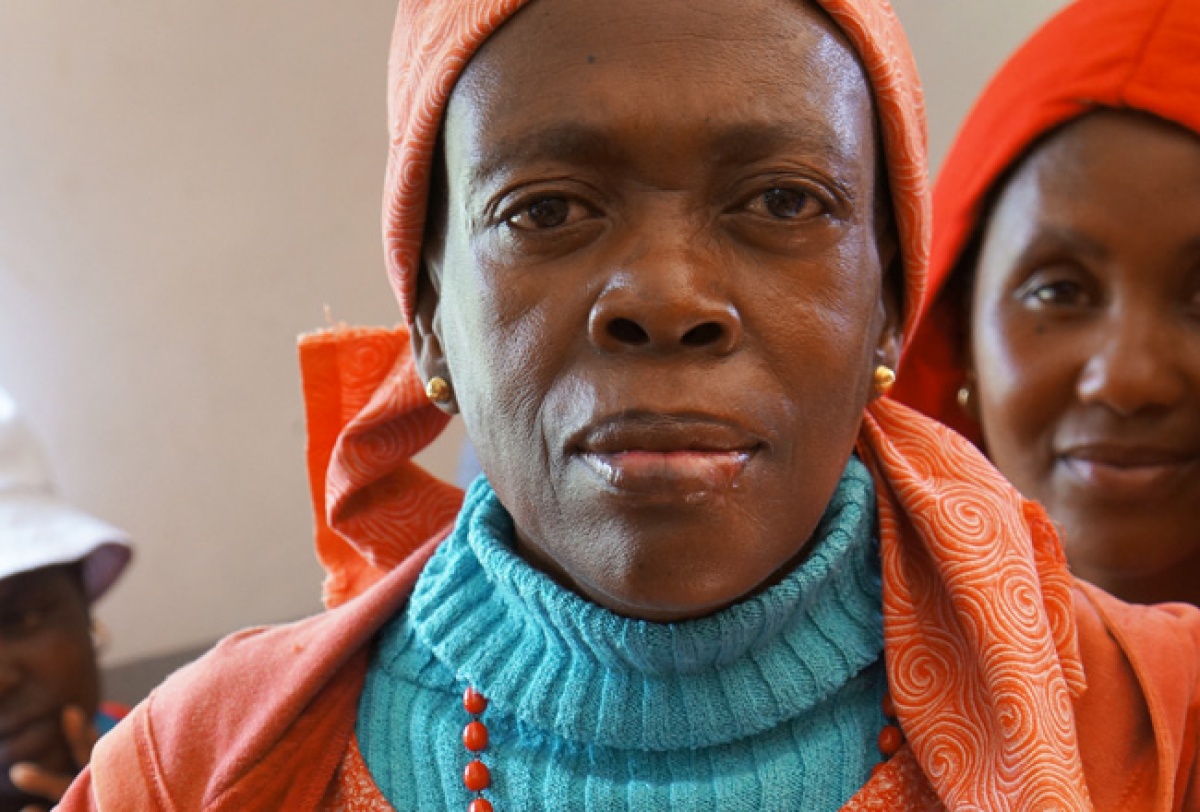Accompanying Mothers in the Mountain Kingdom
Posted on Jul 5, 2013

Lesotho is among the most dangerous countries for pregnant women. From conception to delivery, daunting terrain, sparse medical facilities, and cultural barriers make it difficult to access proper health care. In the Mountain Kingdom, for every 100,000 live births, 1,155 women die from pregnancy-related complications, giving Lesotho one of the highest maternal mortality ratios in the world, according to recent estimates from Measure DHS, a USAID-funded project that collects health data in 90 countries.
But Malineo Sethobane is helping change that. The 50-year-old mother of five began working for Partners In Health/Lesotho in 2010 as a maternal health worker (MHW) in the village of Lipeneng. Because she’s from the community she serves, Sethobane is uniquely situated to connect with women early in their pregnancy. She accompanies them over the following months to make sure they get antenatal care and deliver their children in a safe environment with trained medical staff at the ready.
In 2009, PIH/L piloted its Maternal Mortality Reduction Program (MMRP) in the village of Bobete. “I remember when we started the pilot in Bobete, we wondered ‘why aren’t women coming in for antenatal care?’ We were told it was cultural. The assumption was that women don’t want to come to a facility,” recalled Dr. Hind Satti, Lesotho country director for PIH.
It didn’t take long for the program to engender a drastic shift in how pregnant women seek and obtain health care. The year before the MMRP launched at Bobete Health Center, only 46 women delivered at the facility. In the second year of the program, 216 women delivered at Bobete Health Center.
In the years that followed, PIH/L bolstered its efforts in Bobete, and then expanded to seven other sites.
“Now it’s very acceptable for women to come to give birth in the facilities,” said Satti. “The main reason: we put in good infrastructure, we treat them with dignity, and we provide high-quality services. There had been a lack of trust … it wasn’t because women didn’t want to come.”
Earning that trust wasn’t easy. At every step of the way, Satti and her team were devising sustainable solutions to deeply ingrained problems. They met with village chiefs to build consensus that women shouldn't die while giving birth. From there, they recruited men and women and traditional birth assistants—trusted in the community, but in need of formal training—to work as MHWs. Every MHW passes through a rigorous training program tailored specifically for Lesotho.

Nohana Clinic Site Director Meriam Sesiu Kopeli holds a healthy baby boy. The mother was accompanied to the clinic by PIH/L maternal health worker Malineo Sethobane. Photo: Rebecca E. Rollins/Partners In Health
To overcome transportation difficulties (imagine walking hours through steep mountain paths at night; now imagine doing it while in labor), PIH/L and community members built maternal waiting houses at each clinic. A few weeks before a patient's due date, she’s accompanied by her MWH to one of these waiting houses. Once there, the patient can relax for the remainder of her pregnancy, knowing that she’s only a few yards from trained medical professionals.
Sethobane and the hundreds of other MHWs are the backbone of PIH/L’s MMRP. They form an essential link between the community and the health center, referring patients for care as needed and making sure the health centers respond to the community’s needs.
At Bobete, where the program launched, the number of facility-based deliveries has increased 370 percent since 2009.
On average, MHWs are assigned 75 women. They go door-to-door each month, meeting with every client. If a woman suspects she might be pregnant, the MHW arranges a trip to the clinic for a pregnancy test. The earlier a pregnancy is confirmed, the more effective antenatal care is. MHWs are also trained to educate their communities on HIV testing and family planning.
“MMRP is an intervention that empowers women in rural areas. We’re encouraging them to be productive members of society—not to sit back,” Satti says. “Addressing maternal mortality is a gate for us to address all aspects of women’s health—empowering women, which impacts their children’s and families’ health.”

Two mothers and their infants waiting at Bobete Clinic for postnatal appointments. Photo: Rebecca E. Rollins/Partners In Health
Not only is the program empowering, it’s extraordinarily effective. Last year, more than 1,500 women delivered babies in a health care setting. PIH/L recorded more than 4,500 prenatal care visits, and conducted more than 1,700 HIV tests. At Bobete, where the program launched, the number of facility-based deliveries has increased 370 percent since 2009.
In the few years Sethobane has been working as an MHW, she’s accompanied more than 11 mothers from the village to the health center and made hundreds of home visits. She says she’s learned that commitment to the individual patient is vital, and that simple steps can improve the health of an entire family.
Despite these gains, Lesotho remains a challenging environment to give birth. Satti is confident, however, that the country is heading in the right direction.
“We are not going to accept any maternal deaths. It takes commitment and teamwork to make this happen. We all started with that spirit—that there is no reason a woman should die during pregnancy or giving birth,” she says. “Midwives, drivers all share that spirit. Everybody is ready.”

